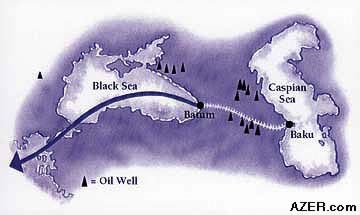|

Winter 2000 (8.4)
Page
84
SOCAR Section
Shell
Promotes Caspian Cooperation
Over
the last few years, Shell has increased its portfolio in the
Caspian region to include activities in all five countries -
Azerbaijan, Kazakhstan, Russia, Iran and Turkmenistan - and is
the only major oil company to do so. Working in each individual
country has brought its challenges. Differences in technology,
culture and approach initially made it more difficult to conduct
business in the littoral states. It hasn't always been easy,
but the initial levels of mistrust are slowly ebbing, allowing
the exchange of Western and Eastern cultures in the development
of hydrocarbons.
Shell's presence in the Caspian 90 years ago was significant,
as almost one-third of the company's global production came from
around Baku. After returning to Azerbaijan in 1999 with the Inam
license, Shell's regional portfolio now consists of: (1) Azerbaijan:
25 per cent, Inam. (2) Kazakhstan: 14.3 percent, OKIOC [Offshore
Kazakhstan International Operating Company. (3) Russia: 7.5 percent
(with Rosneft), Caspian Pipeline Consortium; 62.5 percent, Sakhalin
II (operator); 50 percent, interest in Salym and Komsomol field
developments, alliance with Gazprom with initial focus on Zapolyarnoye
field development. (4) Iran: Soroosh/Nowrooz (buyback with NIOC
[National Iranian Oil Company]), South Caspian Exploration study.
(5) Turkmenistan: 50 percent, Trans-Caspian Gas Pipeline, Upstream
Strategic Alliance.
  Left: Current pipeline route for oil from
Azerbaijan to Western markets. Left: Current pipeline route for oil from
Azerbaijan to Western markets.
As possible and within its role as a private company, Shell has
tried to promote cooperation among the Caspian littoral states.
For example, the company recently sponsored an art exhibit with
Azerbaijani and Turkmen artists in London with the participation
of the respective London embassies.
The Silk Road played a major role in the advancement of cultures
in this region. One of the most important characteristics of
the Road is that each party had something to trade and something
it needed. The Chinese traded their silk in exchange for medicines
and perfume from their western neighbors. Although silk was a
luxury in the Roman Empire in 100 AD, it became common several
decades later.
This showed that through cooperation, the populations became
wealthier, improving their lives. Goods and services as well
as ideas, art and culture were exchanged. What was so advantageous
about the Silk Road is that it was a network of roads - it was
not one single road, which allowed many to profit from the Road's
existence. The parallels with today's version of the Great Game
and multiple pipelines are apparent.
Shell hopes to build on its Caspian presence to play a large
role in the region's hydrocarbon development and increase its
role in the near future. Geography has played and will continue
to play a paramount role in the Caspian. All options for the
evacuation of oil and gas should be considered. Onlookers are
realizing that, like the Silk Road, where multiple options succeeded
in creating what was at that time the world's largest trading
network, multiple oil and gas pipelines will ensure that the
entire region will benefit. For this reason, Shell hopes to be
a catalyst to ensure that energy producers supply those markets
requiring energy. The exclusion of any party will increase tension,
slowing down the significant progress that has been made over
the last decade.
Azerbaijan will play a key role in the Caspian's development,
with substantial oil and, now, gas reserves, as well as becoming
a transportation hub. Shell hopes to build on its participation
in Inam to participate in other opportunities with the Government
of Azerbaijan. The company believes that Azerbaijan is well placed
to act as a hub, potentially supplying oil and gas from its own
prospects - as well as those of its eastern neighbors - to Turkey
and Europe.
International relations and foreign policies are still developing
in the region, but it has been increasingly encouraging that
much of the Caspian's leadership has taken very a realistic outlook.
No single country can do it alone.
____
From Azerbaijan
International
(8.4) Winter 2000.
© Azerbaijan International 2000. All rights reserved.
Back to Index AI 8.4 (Winter
2000)
AI Home
| Magazine Choice | Topics
| Store
| Contact
us
|